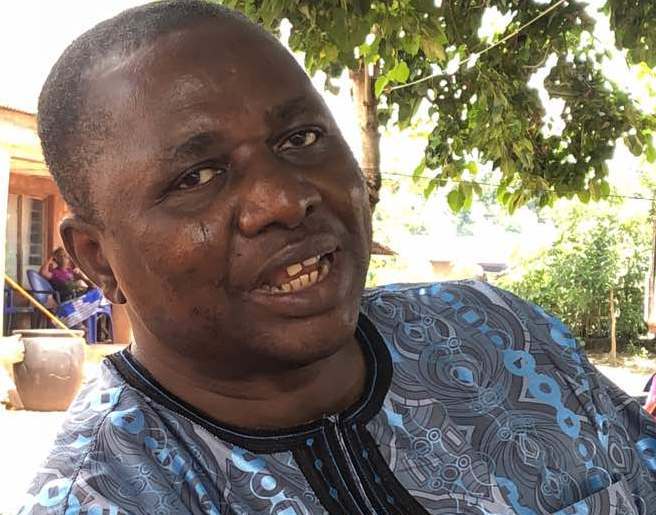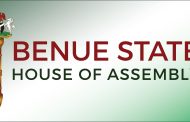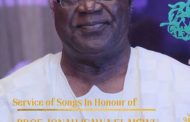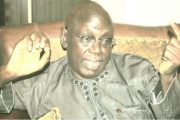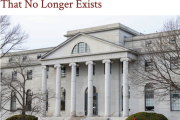The death at 10 pm last Thursday of Dr Emmanuel Udah Olowu at the National Hospital in Abuja, Nigeria is no news anymore. All those who should hear the death of the almost 65 year old academic have already heard. Between that moment and the time of posting this, over a million must have passed on across the world, considering the many troubled spots today, from silent deaths on the streets, in hospitals, in wars, prisons and what have you.
But every death signifies something specific and leaves behind a story worth reflecting upon. Dr. Olowu’s death most probably leaves more than a fair share of stories to be told. Whether this piece can tell all such stories at this point is doubtful. However, whenever and by whoever the story is attempted, it is unlikely that the key point would be other than that of a homeboy who went global, one Nigerian who crossed the bar that providence constructed for him by virtue of place of birth and went on to reconstruct his.
 At that time and even today, Christianity opened the opportunity for qualitative education around the area in question as far back as the mid 1940s. The outcome in the case of Dr Olowu is access to education in spite of the locational disadvantage of a place such as Agbangwe Edumoga where he came from, a geographically excluded backwater in the distribution of educational facilities. So, it is a study in fate that he got in and it produced in him the Philosopher-king who could then become a global rule writer rather than anything else that providence might have demarcated for him.
At that time and even today, Christianity opened the opportunity for qualitative education around the area in question as far back as the mid 1940s. The outcome in the case of Dr Olowu is access to education in spite of the locational disadvantage of a place such as Agbangwe Edumoga where he came from, a geographically excluded backwater in the distribution of educational facilities. So, it is a study in fate that he got in and it produced in him the Philosopher-king who could then become a global rule writer rather than anything else that providence might have demarcated for him.
Both those who met him and came away with a jolly good fellow view of him as well as those who met him and found him sarcastic would have been telling a same story: the story of the highly endowed Philosopher-king. It was neither arrogance nor lack of empathy for those who might not have been as privileged and certainly not lack of suavity. It was the mixture of Philosopher-kinging and the Edumoga in him. That was the essential Olowu.
The Edumoga, (should be Edemoga) part of that theory is not that straightforward but it is the taken for granted narrative. That is the story of a people defined by extreme disposition to kindness, the pure type of kindness. This reporter has not done any research nor in a cultural mood to disturb the narrative, what with the implications that could come with it. But, more importantly, no one who has visited that farming world and benefitted from gift of yams, all sorts of fruits and cholesterol-free meat can dispute this. Perhaps no one can tell this story better than the Canadian visitor to late Mrs Odah in that community. Although the visitor didn’t eat the food because he is a vegetarian, he could see the great care taken to put before him the ensemble of the very best of food and meat when he visited the then General Secretary of the Nigeria Labour Congress, (NLC), John Odah, another Agbangwe man.
The Philosopher-king aspect is less complicated. As the claim in favour of Christianity that opened this piece indicates, the Catholics in particular established leadership grooming secondary schools that would ordinarily NEVER have been the case if they were not involved. They did not just establish and maintain these schools, they were more considerate in distributing them. That is the only way that a place such as Ugbokolo could get an Emmanuel Secondary School at a time the Nigerian Civil War was on. Or Amoke where St John Secondary School was located. And so on and so forth. Saint Francis College, Otukpo, for example, was built in 1946, just a year after the end of the 2nd World War. They did not leave the gender dimension out, having established Holy Rosary College, Adoka as early as 1957 only to follow up with with St Anne’s College, Otukpo which was the female version of Emmanuel Secondary School, Ugbokolo. In number and in stature, these faith based schools dominated the educational space, at least in the entire Idomaland, with names such as Mount Saint Michaels, Aliade; Mount Saint Gabriels, Makurdi; Wesley High School, Otukpo; Methodist High School, Igumale; Jesus College, Otukpo and so on.
It was one of these schools Olowu went, specifically Mount Saint Michaels, Aliade which was and might still be in a class of its own if it has not been damaged beyond recognition by elite incompetence in managing education in Nigeria today. The long and short of it is that he started life with grooming in being a Philosopher-king: the idea that the rule of the thumb is not good enough and there must be grooming in knowledge for leadership, whether in the broad sense of it or in the sense of of leadership as political office.
 Dr. Olowu’s next step was the Ahmadu Bello University, Zaria of the late 1970s – one of the very best and then he went to the University of Pennsylvania, a member of the Ivy League club in the United States. In other words, right from the secondary school up to PhD level, he went to the very best available and got the best quality of education that anyone in his generation could get. Going to the University of Pennsylvania marks the first dimension of going global even as a homeboy because the University of Pennsylvania is a global player in its own right. And there are just too many things he knew and did that he could not have known or known it differently if he did not attend that university. No one can help wondering how someone from his native Agbangwe of the time in Nigeria could climb that far. It was, therefore, perhaps great that he became very religious at a point in his life. The idea of giving praise to God may not just be illusory for such a man.
Dr. Olowu’s next step was the Ahmadu Bello University, Zaria of the late 1970s – one of the very best and then he went to the University of Pennsylvania, a member of the Ivy League club in the United States. In other words, right from the secondary school up to PhD level, he went to the very best available and got the best quality of education that anyone in his generation could get. Going to the University of Pennsylvania marks the first dimension of going global even as a homeboy because the University of Pennsylvania is a global player in its own right. And there are just too many things he knew and did that he could not have known or known it differently if he did not attend that university. No one can help wondering how someone from his native Agbangwe of the time in Nigeria could climb that far. It was, therefore, perhaps great that he became very religious at a point in his life. The idea of giving praise to God may not just be illusory for such a man.
Like every other thing, however, Philosopher-kinging had its own paradox for Dr. Olowu. Nigeria could not cope with him or is it better to say that he could not cope with Nigeria? And this takes us to the second dimension of his going global. It was his rise to the position of Acting Director-General of the National Drug Law Enforcement Agency, (NDLEA) shortly after the exit of Police chief, Fidelis Oyakhilome. He worked fine with Oyakhilome who, it seems, gave him the cover to luxuriate, professionally. It must have been the meeting and mixing of a trained Criminologist, (Dr. Olowu) and a practitioner, (Fidelis Oyakhilome) of the field.
Selected and further trained in the UK and France, he was an arm bearer for the job he did. One day at the Murtala Mohammed Airport in Lagos, he nabbed a young courier. It was an operation he led. The story is that he told the young man to move over, which could be their own lingo for ‘the game is up and you risk being shot if you move otherwise’. Then the young man said something like, ‘are you new in this place? He meant that his boss had seen those that needed to be seen before then’. Unfortunately, he infuriated Dr. Olowu further and he ended up in the NDLEA gulag. The claim is that this explains why Olowu was never confirmed as the substantive DG of NDLEA. This story was not told by Olowu himself but, even then, it can only be just one of the even less revealing stuff that could come from that world. Military politics more than the influence of cartel chiefs more likely explains why he never became the substantive occupant of the position. Rather, it was given to General Musa Bamaiyi.
His stint at NDLEA was the second dimension of going global because that domain is the domain of global power politics in terms of the United States as the global rule writer there. Global rule writer here is not in the conventional, economistic sense of imperialism but in the sense of neoliberalism as a doctrine and practice of disciplinary power, much, much beyond imposing, say, Structural Adjustment Programs, (SAP). That doctrine and practice rests on the idea of the state as a pastoral practitioner or the ultimate care giver, a process operationalised through biopolitical practices such as the panoptic gaze, (surveillance), healthcare practices such as inoculation, census and related state practices of managing a free population. That is to say that neoliberalism is the Western practice of state power upon which modernity is anchored. Neoliberalism as the essence of the state did not exist before the 18th century. It is this Panopticism that explains the global character of, say, the United States in that they are not content with defining the pastoral essence of state power strictly in terms of American citizens within the territory of the American State but also outside of the United States wherever they see whatever they define as a threat. Drugs trade is one of such threats and they insist on writing the rules for everyone about how to fight drugs, for example. Of course, the question of where neoliberalism becomes imperialism or imperialism assumes neoliberal character is what can only be decided by each reader.
What this background means is that whether Dr Olowu’s professionalism in drug control followed American scripts or not, he was a powerful operator in an arena that was truly global in scale. Nigeria is, of course, a global player, potentially and actually and there is no way a highly trained Nigerian in any such domain will not have some influence in enacting the scripts, no matter who wrote them. It is doubtful if the folks back home can appreciate how far their homeboy went.
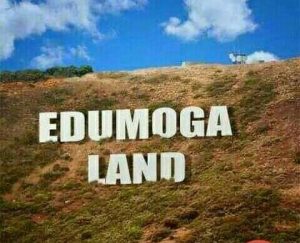 It was a pleasure listening to him on his hospital bed. Even under the multiple pains and condition of stillness for three months, he was never a pitiable soul. Sharp witted, sometimes uncomfortably blunt but he was in complete control of his memory. He recollects almost all members of his class and school mates, still knows where some of them are and could say what one of them or the other did or didn’t do, either in the secondary school or so. In some cases, he was given the phone to speak with one of them and the conversation was always such that the person at the other end would not know he was sick if s/he had not been told he was. Similarly, he could mimic whichever of his lecturers in Zaria he chose to. The memory was unimpaired although many things were clashing in his memory.
It was a pleasure listening to him on his hospital bed. Even under the multiple pains and condition of stillness for three months, he was never a pitiable soul. Sharp witted, sometimes uncomfortably blunt but he was in complete control of his memory. He recollects almost all members of his class and school mates, still knows where some of them are and could say what one of them or the other did or didn’t do, either in the secondary school or so. In some cases, he was given the phone to speak with one of them and the conversation was always such that the person at the other end would not know he was sick if s/he had not been told he was. Similarly, he could mimic whichever of his lecturers in Zaria he chose to. The memory was unimpaired although many things were clashing in his memory.
A day or the very day he was taken to the Intensive Care Unit, (ICU), he was insistent on being discharged. Some people read that to mean he knew he was dying. That is possible just as that insistence could also have been the essential Olowu who did not believe he could be conquered, not even by death.
Did the shortshrifting of his stint at the NDLEA leave a long lasting impact on his psyche? It is possible just as he might have taken it as a distraction he was too superior to bother about. Any categorical answer would now rest in speculation since this reporter did not have any direct discussion with him on his life during the NDLEA period.
It was actually only in December 2018 that Intervention ran into him at a burial. At that meeting, his greatest worry was the condition of the roads in Benue State, specifically between Makurdi and Otukpo. The interview which ensued during that encounter and published on September 16th, 2018 now has 938 readers at the level of the Intervention website, (https://intervention.ng/13168/). It could be slightly higher on Facebook.
Dr Olowu was not a populist. He was a failure in that. Not for him any mounting the podium to promise building a bridge where a river does not even exist. Again, that speaks to the Philosopher-king in him. But the inspirational force of his story makes him a perfect symbolism for younger people from his area. The logic is that everyone can go farther than the bar providence might have set for him or her. That is, go far in the authority of knowledge and skill, not in self-humiliating attempts at learning how to dance on top of the needle that people do nowadays so as to get rich or be in power. Asking younger ones to look at providence in the face is not unmindful of the fact that, unlike the days the Olowus were growing up, there are no even the good schools to go to nowadays as a way of escaping the limiting bounds of providence. The new guys in power have, consciously and unconsciously, destroyed all of that. So, we need to take note of that challenge.
Finally, going far in life is not always about being brilliant. Dr. Olowu must have been very brilliant to have passed through Mount Saint Michaels, Aliade of those days and to enter ABU, Zaria, be retained as a Graduate Assistant in Zaria and then be admitted to undertake a PhD at the University of Pennsylvania, completing the program under three years. But brilliance alone is never ever enough. There is always someone there who, through advise, guidance and related support, points at a particular direction and, in some cases, helps to open the way. The name of that person is missing in the Olowu story so far. Could it have been Dr. Patrick Wilmot with whom he didn’t appear to be close but who was a main figure with exposure in ABU, Zaria then? The hunch here is that it was most likely Prof Femi Odekunle who himself studied Criminology in Pennsylvania and most likely wanted some of his best students to replicate his own experience. Intervention will update this story accordingly as soon as that is established. May we all stand up and give Dr Emmanuel Udah Olowu a standing burial, for showing the way in his own ways!

